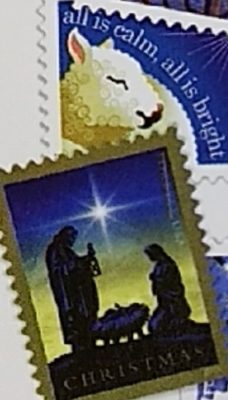I started this post basically as a shout-out to the post office for doing a pretty good job of covering the range of holiday stamp needs. If you want to honor a major religious or ethnic northern-hemisphere-winter celebration with your stamp choice, the U.S. post office has you pretty well covered.
Jews and African-Americans will find Hanukkah and Kwanzaa stamps.

Christians who want to focus on the religious aspects of the holiday have two choices—manger scene with star, or the slightly more subtle lamb. (Is it the Lamb of God? Is it a reference to flocks watched over by shepherds at night? It’s a stretch, but you could even choose to pretend it’s a secular reference to wool production and the making of cozy sweaters—an option I mention because it’s a real possibility in this household.)

If your winter-holiday celebration has its roots in the Christian tradition, but is a bit less religious-focused, you have several choices. There’s a kid in a snow-suit making a snow-angel, a one-horse-open-sleigh reference, a Santa Claus, and some holiday decorations with Christmas cookies.


There’s even a stamp for Diwali (and the post office always has a stamp for Eid, although I guess this year, since Ramadan was back in the summer, they didn’t see fit to include it with the winter holiday stamps).

But just as I was getting ready to sing the praises of the U.S. Post Office for hitting just about every note, I realized that they’d left me out. There’s no stamp for me to put on my solstice cards. Those bastards!
I shall have to write a strong letter of protest.

